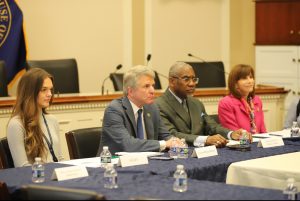McCaul, Meeks Host Roundtable on Crisis Facing Afghan Women and Girls
Washington, D.C. – Today, House Foreign Affairs Committee Chairman Michael McCaul (R-TX) and Ranking Member Gregory W. Meeks (D-NY) participated in a roundtable discussion focused on the challenges facing women and girls in Afghanistan after the Taliban takeover. Members of the committee heard from former Afghan Ambassador to the U.S. Roya Rahmani, former Afghan diplomat Hadeia Amiry, and former Kabul Deputy Governor Hanifa Girowal. The chairman delivered the following remarks at today’s roundtable.
– Remarks as Delivered –
I want to thank all of you for attending this important roundtable on the crisis facing Afghan women and girls under the Taliban’s oppressive rule in Afghanistan.
I want to thank my dear friend Ambassador Roya Rahmani, [who] served [her] country very well and is a dear friend of mine.
And also Ms. Hadeia Amiry, and Hanifa Girowal for joining us here today. It is important that we have this discussion on Afghanistan women, led by Afghan women.
I have watched with great concern as the Taliban has continued to restrict the rights of women and girls in Afghanistan since the collapse in August of 2021.
I have heard from many women who have witnessed the barbaric actions of the Taliban firsthand.
Since the Taliban take over, nearly 20 years of progress in women’s rights have been erased. The Taliban has issued more than 30 edicts aimed at severely limiting women’s freedoms.
Afghanistan is the only country in the world where girls are banned from attending school above the 6th grade. The only country in the world.
The Taliban has also banned Afghan women from working for NGOs, which is a big concern of mine. Samantha Power, USAID, [is] testifying this afternoon. I am going to ask her about this. But also prohibited from working for the United Nations. They’ve inhibited the delivery of humanitarian aid, which is desperately needed by the women in Afghanistan.
Afghan women and girls are not allowed to go to public parks. They’re required to cover their faces in public, and must be escorted by a male chaperone, or “mahram” whenever they leave the house.
The Taliban has essentially banned women from public life and intends to permanently place all women on house arrest.
Quite frankly, they’re treated like property.
Moreover, in addition to losing their rights and their freedoms, women and girls who disobey the Taliban’s edicts have been flogged, whipped, stoned, tortured, and killed. Afghan women are forced into marriages with Taliban fighters and face constant threats of sexual assault.
We continue to work to evacuate at-risk Afghan allies, especially women and children, from Afghanistan because they are simply not safe.
During the fall of Kabul, there was so much chaos, it seemed every congressional office turned into its very own State Department. Members were helping anyone they possibly could evacuate.
I know I helped Roya, we helped your family. Sixteen family members.
The women were especially desperate to save their children and themselves from the Taliban. We all remember the photos of the mothers attempting to throw their children over barbed-wire fences and into the arms of the U.S. military.
One group of children I remember very distinctly, music students with the Afghanistan National Institute of Music, waited outside the gates of the airport for 17 hours while I and other members made desperate high-level calls to try to secure their passage to the airport and onto an evacuating plane.
However, they never made it inside the airport that day.
I had always wondered what had happened to them until I was at a GRAMMYs on the Hill award ceremony and next to me was a man from Kabul who had a music school in Portugal.
And I remembered that these girls had Portuguese visas. And I put the two together and asked him if this was his school, were these his girls. And he said yes. I said are they safe, he said yes.
And it was an amazing, amazing epiphany.
And Jessica Lustig who is here, I reconnected with her, she is here today in the audience on behalf of the National Institute of Music. And thank you for being here as well.
We are making plans now to have the girls come and play at the Kennedy Center to play their Afghanistan cultural music and they have hopes of one day returning to their country.
I am so proud of them and they are rebuilding that school.
I want to thank you Jessica and everyone else who worked tirelessly to get people out. Not only the Afghan partners, interpreters, Americans, but especially the women and children during this withdrawal.
Because to be left behind, to go back to Sharia Law that they’ve never lived in before, is truly a nightmare of an experience.
But for every success story, there are more horror stories of women and girls who were unable to escape and now live under Taliban rule.
This committee will do everything in its power to help Afghan women and girls. And to hold the Taliban accountable for its human rights abuses. So, I look forward to hearing from our distinguished guests today.
It’s going to be a great conversation and I want to thank all of you for being here.
And with that, I now recognize Ranking Member Meeks for an opening statement.
###
